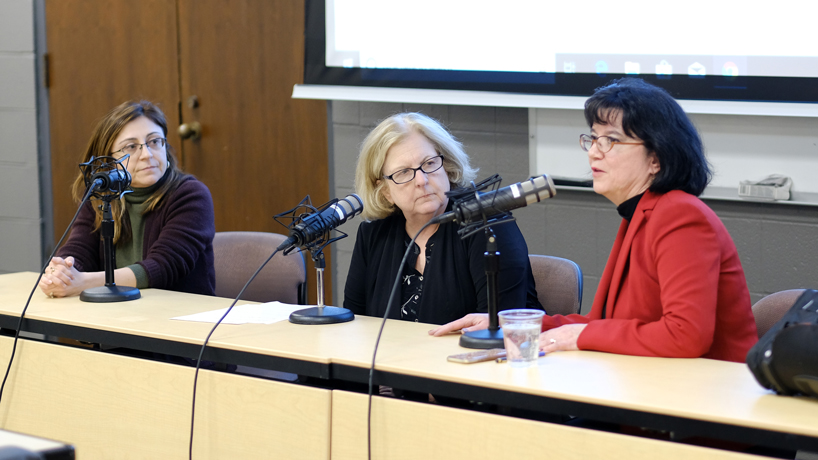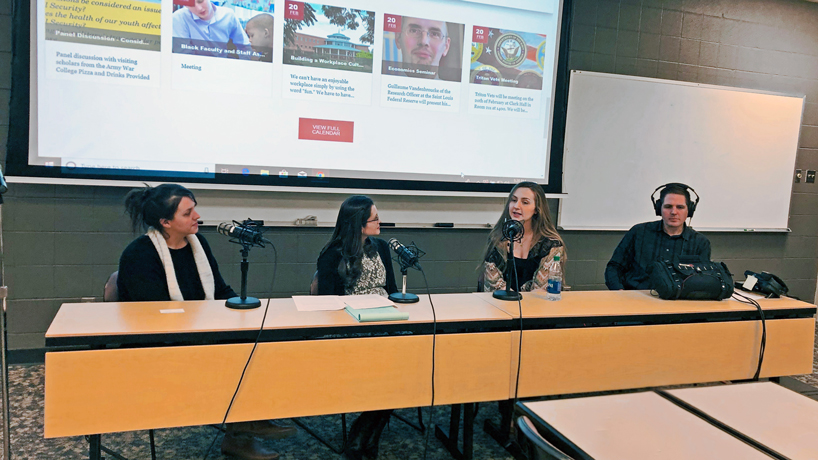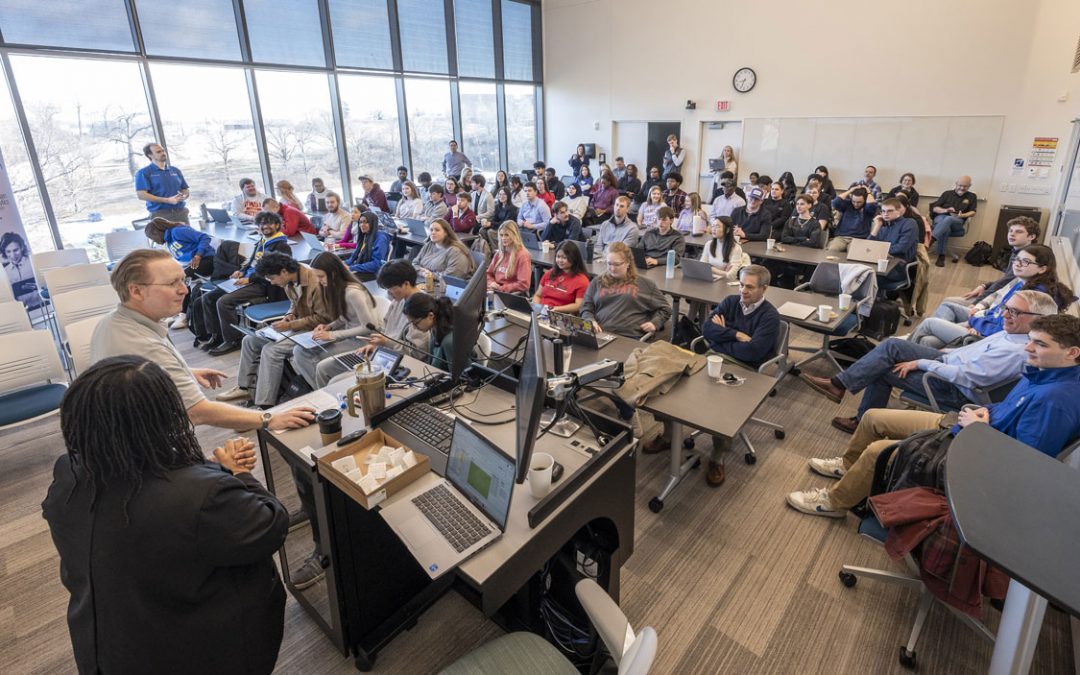
Associate Provost Marie Mora (at right) responds to a question during a recording of the Federal Reserve Bank of St. Louis’ “Women in Economics” podcast on Feb. 20 in the J.C. Penney Conference Center. Mora and Professor Lea-Rachel Kosnik (left) were guests of host Mary Suiter (center), and the show, released March 31, also featured conversations with several UMSL students. (Photo by August Jennewein)
Mary Suiter was late to learn about podcasts as they were coming into prominence, so the University of Missouri–St. Louis alumna has been as surprised as anyone to end up working on one.
Suiter, the assistant vice president and economic education officer at the Federal Reserve Bank of St. Louis, has spent the past two years serving as the host of “Women in Economics.” Launched in March 2018, the show series highlights the studies and careers of women making their marks in the field of economics and recently published its 32nd episode.
“I’ve really enjoyed it a lot,” Suiter said. “I enjoy talking to the women we’ve interviewed. I’ve learned so much from them, and I’ve had some people reach out to me and say, ‘Hey, I’ve been listening to the podcast.’ That’s pretty cool.”
Suiter hopes that by sharing the stories of women’s experiences and success she can help encourage a few more to choose economics as their career – because roughly two-thirds of the students earning bachelor’s degrees and PhDs remain men.
It was fitting that for the latest episode of “Women in Economics” Suiter returned to UMSL, the place that helped launch her career and introduced her to mentors such as faculty members Sarapage McCorkle, Sharon Levin and Susan Feigenbaum.
Today, those women have all retired. But UMSL’s Department of Economics remains a stronghold of women in economics. That includes the chair, Anne Winkler, and professors such as Marie Mora and Lea-Rachel Kosnik, who continue to work proactively to bring more women to the field.
Senior Hannah Drury (third from left) talks about the encouragement she received from Professor Lea-Rachel Kosnik when deciding to major in economics. Drury and Geraldine Germain (at left) were two of the five UMSL students to join host Andrea Caceres-Santamaria (center) on the “Women in Economics” podcast recorded Feb. 20 at UMSL. (Photo by Steve Walentik)
Mora, UMSL’s associate provost for academic affairs, and Kosnik both joined Suiter on the podcast, released March 31.
“One of the reasons I was very interested in this position here at the University of Missouri–St. Louis was because of the focus and some of the responsibilities in the administrative position to work on diversity and equity issues,” said Mora, who earlier this year was part of a panel on Launching a Professional Development Initiative co-hosted by the American Economic Association’s Committee on the Status of Women in the Economics Profession. “In the case of my role, particularly among faculty, I’ve been very involved with trying to increase diversity and inclusion in economics essentially through my entire career.
“It’s one of the things that got me interested in economics to begin with many years ago. I think it’s extremely important that we have more diversity in the profession.”
That’s true not only of women but also of underrepresented minorities of any gender because, Mora noted, economic research conducted in the academic environment can play a significant role in the development of policies that impact everyone.
“You need diverse researchers even doing the research,” Kosnik said. “There’s a lot of research areas that were not studied, I believe, because there weren’t women to study them who maybe had the perspective on them.”
Both Mora and Kosnik described their experiences getting into a field that has not always been very welcoming.
“I had a fantastic major professor, who said, ‘In order to survive in this field, you have to have a very thick skin,’” said Mora, who arrived at UMSL last May after four years at the University of Texas Rio Grande Valley. “That advice stuck with me. I do realize that there are times that you need to put yourself forward to establish your credentials. And one of the ways that I found with respect to my classes is actually putting in a brief bio about myself on my syllabus and talking about that I have a PhD, and I go through some of my history.”
Kosnik, who joined the UMSL faculty in 2004, talked about the importance of mentorship to encourage women who otherwise might choose to use their talents in other fields.
“It’s an old boys’ club, and you need these networks, and you need role models and mentors,” she said. “Having more professors who are female and who are teaching and who show it can be done and how to do it, then you’ll get more majors. Then, when you have more majors, you can also network and get them into a club, then they’ll get more jobs.”
Kosnik serves as the advisor for UMSL’s Women in Economics organization, which organizes social gatherings for female majors throughout the semester to help give them a sense of belonging.
It benefitted senior Hannah Drury, one of five UMSL students who also took part in the podcast.
“When Professor Kosnik invited me to the Women in Economics barbecue last year, I met a few different women there,” said Drury, who has a job lined up at Ameren after graduation. “I liked the idea of having a group of people that I could share interests with and talk about, especially females.”
Listeners also heard from graduate students Geraldine Germain and Maia Elkana and juniors Sindi Ceta and Ashlee Sprock.
Germain’s pursuit of her master’s in economics began after a decade in social work, and she was drawn by the chance to work on the policy issues that were impacting her clients.
“Over ten years providing services to underserved communities, you start to see patterns,” Germain said. “You start to see structural, systemic problems come to light, and it’s a wonderful experience being on the frontlines and seeing it from that ground level, having that kind of social worker perspective, but I started to see a need for bigger changes, for policy changes, changes in institutions.
“I decided to go back to school and, hopefully, combine the social work experience with the economic perspective, learn to think like an economist, learn to solve problems like an economist, to really make the changes we need to see happen in our community and globally, as well.”
She has the type of perspective that might otherwise be missing.
To listen to the entire episode of the “Women in Economics” podcast recorded at UMSL, click here.















